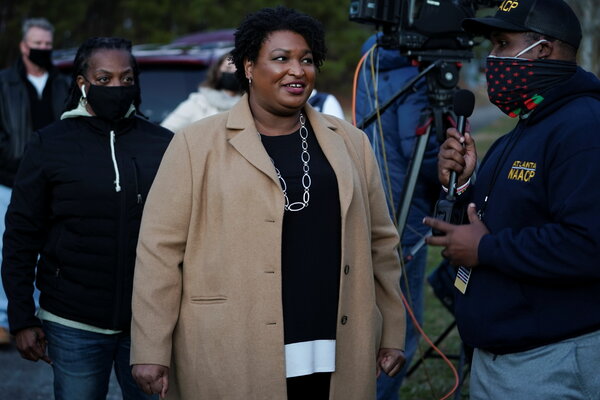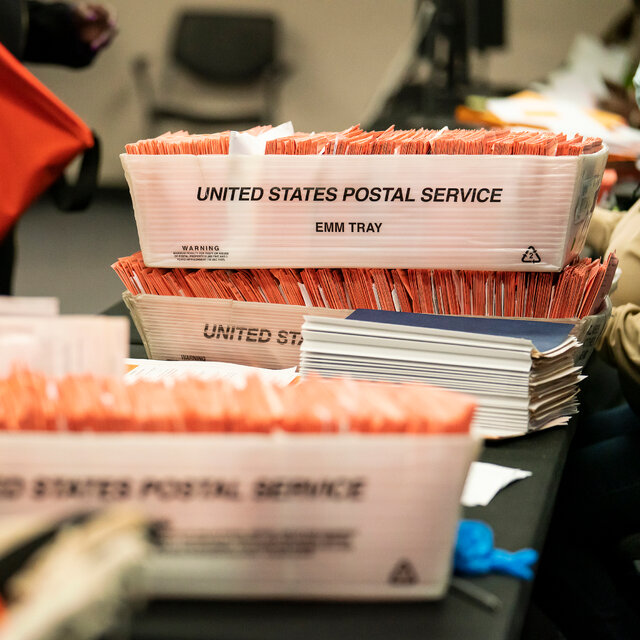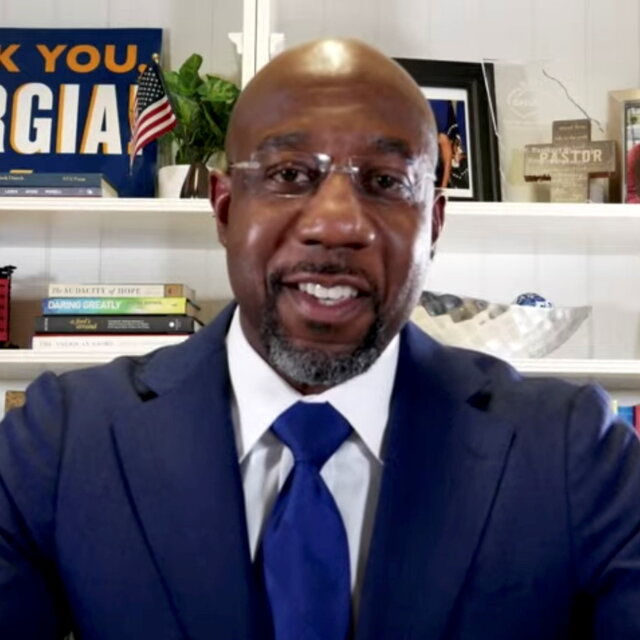Georgia Senate Runoff Elections: Live Updates – The New York Times
Democrats inched closer to taking control of the Senate on Wednesday, winning one of the two Georgia seats up for grabs in a pair of runoff elections while the second contest remained too close to call.
The Rev. Raphael Warnock, a Democrat and the pastor at the historic Ebenezer Baptist Church in Atlanta, defeated Senator Kelly Loeffler, a Republican, to become the first Black senator in Georgia history and the first Black Democrat to be elected to the Senate in the South.
In the other contest, David Perdue, the Republican whose Senate term ended on Sunday, and his Democratic challenger, Jon Ossoff, were neck-and-neck, with thousands of votes still to be counted, many of them from Democratic-leaning areas.

Listen to ‘The Daily’: A Historic Night in Georgia
As the results from two highly anticipated runoff elections roll in, control of the Senate appears to be within reach for the Democrats.
Both political parties were on edge overnight given the extraordinary stakes, with President-elect Joseph R. Biden Jr.’s ability to enact much of his agenda hanging in the balance. If Democrats win both races, the party would hold 50 seats in the Senate and de facto control of the chamber, with Vice President-elect Kamala Harris serving as the tiebreaking vote and Senator Mitch McConnell relegated to becoming minority leader.
The twin races drew record levels of campaign spending — roughly half a billion dollars in two months — and national attention, with President Trump and Mr. Biden both campaigning in the state on Monday.
The remaining uncounted vote in Georgia appeared largely to be in Democratic-leaning counties in the Atlanta area, such as DeKalb and Fulton counties, as well as ballots from voters in the military and overseas. The focus on Wednesday morning is sure to be on those Atlanta-area counties and how they might affect the margins for Mr. Ossoff. The Democrats were winning overwhelming shares of votes in that region, especially of mail-in and votes that were cast early.
“The outstanding vote is squarely in parts of the state where Jon’s performance has been dominant,” said Mr. Ossoff’s campaign manager Ellen Foster in a statement early Wednesday.
The Perdue campaign issued a statement after 2 a.m. also predicting victory, while calling for “time and transparency.” The statement suggested that the campaign expected to soon fall behind in the balloting as it promised to “mobilize every available resource and exhaust every legal recourse to ensure all legally cast ballots are properly counted.”
Democrats had ended Tuesday night with growing confidence, as the results showed both Mr. Warnock and Mr. Ossoff carrying a larger share of the vote in county after county than Mr. Biden did in November, when he became the first Democratic presidential candidate to win Georgia since 1992.
“Spitballing here,” wrote Ron Klain, Mr. Biden’s incoming chief of staff, on Twitter, “but it may be that telling voters that you intend to ignore their verdict and overturn their votes from the November election was NOT a great closing argument for @KLoeffler.”
He tagged Ms. Loeffler, who on the eve of the election had said she would side with Mr. Trump and his baseless claims of voter fraud in objecting to the certification of Mr. Biden’s victory.
Ms. Loeffler spoke to supporters around midnight, before The Associated Press and other media outlets called the contest, and declined to concede.
But Republicans were already indulging in some early recriminations.
“Suburbs, my friends, the suburbs,” said Josh Holmes, a Republican strategist and former chief of staff to Mr. McConnell. “I feel like a one trick pony but here we are again. We went from talking about jobs and the economy to Qanon election conspiracies in 4 short years and — as it turns out — they were listening!”
In Cobb County, a populous suburb outside of Atlanta, Mr. Perdue had only 44 percent of the vote, with most of the votes counted; in his first Senate race in 2014, he had carried that same county with more than 55 percent.
Mr. Perdue and Ms. Loeffler had largely sought to nationalize the race, and raise the specter of complete Democratic control of Washington, portraying the party as dangerously radical. But that message was deeply complicated for Republicans by Mr. Trump’s insistence that he did not actually lose.
In the end, about 95 percent of voters in both runoff races said that determining control of the Senate was a “major factor” in their vote, according to A.P. voter surveys, with about three in five calling it “the single most important factor.”

With control of the Senate hanging in the balance, the second runoff contest in Georgia remained too close to call on Wednesday as the Democratic candidate, Jon Ossoff, widened his lead over the Republican challenger, David Perdue, to 16,370 votes.
After trading leads earlier in the evening, Mr. Ossoff pulled ahead of Mr. Perdue overnight, but by just 0.4 percent — within the range that could trigger a recount.
The victory by the Rev. Raphael Warnock, the Democratic candidate in Georgia’s other Senate runoff, meant that whichever party wins the Ossoff-Perdue race will capture control of the Senate.
Democrats saw some signs for optimism. Mr. Ossoff, a 33-year-old documentary film executive, was winning a larger share of the vote in county after county than President-elect Joseph R. Biden Jr. won in November, when he narrowly carried the state.
Mr. Ossoff’s campaign manager Ellen Foster said in a statement on Wednesday that she expected Mr. Ossoff to win. “The outstanding vote is squarely in parts of the state where Jon’s performance has been dominant,” she said.
Perdue campaign officials said in a statement issued early Wednesday that the race was “exceptionally close,” but said they believed they would win and would use “every available resource and exhaust every recourse to ensure all legally cast ballots are properly counted.”
It could be some time before there is a call in the race, with thousands of late absentee and provisional ballots still to be counted. Under Georgia law, a candidate can request a recount if the margin of victory is less than half a percentage point.
The largest block of remaining ballots to be counted was the in-person vote in DeKalb County, a heavily Democratic area that includes part of Atlanta.
Democrats benefited from a strong turnout among Black voters. According to data compiled by georgiavotes.com, Black voters made up a larger share of early voters for the runoff — nearly 31 percent — than they did in the general election, when it was closer to 28 percent.
Mr. Warnock, who is the pastor of Ebenezer Baptist Church in Atlanta, the spiritual home of the Rev. Dr. Martin Luther King Jr., was the first Black Democrat elected to the Senate from the South. He and Mr. Ossoff ran in tandem throughout the runoffs.
Mr. Perdue, the former chief executive of Dollar General, and Ms. Loeffler, who was appointed to the Senate a year ago and was seeking a full term, had cast the race as a necessary check on Democratic power in Washington in 2021, though these efforts have been complicated by President Trump’s continued insistence, without evidence, that he won re-election.

The House and Senate will convene Wednesday afternoon for a remarkable joint session to formalize President-elect Joseph R. Biden Jr.’s Electoral College victory, with President Trump and his allies plotting to transform the counting session into one final, futile attempt to overturn the results.
Bipartisan majorities in both chambers are prepared to meet late into the night to beat back the challenges and confirm Mr. Biden as the winner. But by using what is typically a ceremonial proceeding as a forum for trying to subvert a democratic election, Mr. Trump and his allies are going where no party has since the Reconstruction era of the 19th century, when Congress bargained over the presidency.
Its implications, for future elections and the Republican Party, could be significant.
At least four Republican senators — Ted Cruz of Texas, Josh Hawley of Missouri, Kelly Loeffler of Georgia and Tommy Tuberville of Alabama — have agreed to join House members to challenge the results of three battleground states Mr. Biden won: Arizona, Georgia and Pennsylvania. Senators were still weighing whether to join House members to similarly challenge the outcome in Michigan, Nevada and Wisconsin.
In each case, their objections will force the House and Senate to debate Mr. Trump’s baseless claims of election fraud for up to two hours and then vote whether to accept or reject the results certified by the state. A process that typically consists of less than an hour of glorified paperwork could take anywhere from nine to 24 hours, starting at 1 p.m. Eastern.
Even before it began, the session was already driving sharp wedges into the Republican Party that threatened to do lasting damage to its cohesion, as lawmakers decided to cast their lot with Mr. Trump or the Constitution. Top party leaders in the House and Senate appeared to be headed for a high-profile split. And while only a dozen or so senators were expected to vote to reject the outcome in key states, as many as 70 percent of House Republicans could join the effort, stoking the dangerous belief of tens of millions of voters that Mr. Biden was elected illegitimately.
Presiding over the whole affair will be Vice President Mike Pence, whom statute and tradition dictate must ultimately declare Mr. Biden the winner. Mr. Trump is pressuring him to go rogue and reject electors in key battleground states he lost, handing them a second term.
The demand ensures Mr. Pence, too, must choose between the Constitution and his loyalty to Mr. Trump. The answer could shape his own political future.

On Wednesday, Congress will hold a joint session to record the votes of the Electoral College and confirm the victory of President-elect Joseph R. Biden Jr. The process is normally a perfunctory one, but this time, a number of Republican lawmakers plan to object to the votes of some electors. Here’s how the session will proceed.
The Republicans’ effort, based on spurious allegations of massive voter fraud that have already been rejected in nearly 60 legal cases, is all but certain to fail.
Election results have already been certified in all 50 states, and the Democratic majority in the House virtually guarantees that Mr. Biden’s victory will be confirmed on Wednesday. However, the objections planned for Wednesday, based on claims that lack evidence, underscore an era of bare-knuckle politicization that threatens to crack the foundations of even the most routine government proceedings.

The Rev. Raphael Warnock, the first Black Democrat elected to the Senate from the South, promised Georgia voters early Wednesday that he would work on their behalf while staying true to his roots.
“We were told that we couldn’t win this election,” said Mr. Warnock, who was declared the victor over the Republican incumbent, Kelly Loeffler, shortly after making his remarks. “But tonight, we proved that with hope, hard work and the people by our side, anything is possible.”
Mr. Warnock, the 51- year-old pastor at the storied Ebenezer Baptist Church, marveled at his experience compared to that of his mother, who he said “used to pick somebody else’s cotton” as a teenager.
“But the other day, because this is America, the 82-year-old hands that used to pick somebody else’s cotton went to the polls and picked her youngest son to be a United States senator,” he said.
Mr. Warnock grew up in a housing project in Savannah, Ga., where he was the 11th of 12 siblings. Both his parents were pastors. He gave his own first sermon at the age of 11 and, after graduating from Morehouse College, went on to Union Theological Seminary in New York, where he also worked as a youth minister at the Abyssinian Baptist Church, where another preacher-turned-politician, Adam Clayton Powell Jr., once led.
For more than 15 years, he has spoken from Ebenezer Baptist Church, once the home of the Rev. Dr. Martin Luther King Jr., preaching about politics from the church pulpit.
He has said some of his sermons are designed to make people uncomfortable, urging Black churches to be more accepting of gay people and criticizing them for being “shamefully slow” to focus on gender inequality. In his book, “The Divided Mind of the Black Church,” he criticized white churches for being participants “in slavery, segregation and other manifestations of white supremacy.”
Mr. Warnock, speaking before dawn on Wednesday, told voters that he was honored by the faith they had shown in him.
“May my story be an inspiration to some young person who is trying to grasp and grab hold of the American dream.”

Thousands of President Trump’s supporters are expected to gather in Washington on Wednesday to hear him rehash false claims of voter fraud in the November election, just as Congress begins formally counting the Electoral College vote.
Local officials have urged residents to avoid potentially violent agitators who are expected to gather at the rally, steps from the White House. Some Trump supporters clashed with police near Black Lives Matter Plaza on Tuesday night, hours after some of the president’s allies — including the conspiracy theorist and conservative radio host Alex Jones — spoke to hundreds of people in a nearby plaza.
More Trump supporters are expected to arrive on Wednesday. One such group, of more than 200 people, left a Detroit suburb on Tuesday night for an overnight bus journey to Washington. They carried Trump flags, hats and signs, along with pillows, blankets, snacks to get them through the 10-hour trip.
Michelle Allen, 59, of Swartz Creek, Mich., said she was on a mission to save democracy.
“We have to be there to stand up to the fraud in this election because if we don’t do it now, we’ll never get another chance to make a difference,” she said, referring to Mr. Trump’s baseless claims of widespread voter fraud. “And this is more than just him staying in the White House, although I pray that he does.”
Tens of thousands of protesters are expected throughout the week, and local authorities have been enhancing security. About 340 National Guard troops are expected to be present for rallies in the city on Wednesday, at Mayor Muriel Bowser’s request.
“Protest organizations and the groups they represent have shown an alarming affinity for violence,” Marc Elrich, the executive of Montgomery County, Md., said in a statement. “Sadly, they have not been shy about suggesting the need for violence.”
Four people were stabbed in the city last month during clashes between Trump supporters and counterprotesters.
Ms. Allen, the Trump supporter from Michigan, said she was not particularly worried about the potential for violence in the capital, and that she had not brought her gun along for the trip. “If there are guns there, it will be Antifa and B.L.M.,” she added, referring to antifascist activists and Black Lives Matter protesters.
Another member of the Michigan group, Suzanne Doherty, said she was a little concerned about possible chaos at the Trump rally — and had asked herself if the trip was worth it.
“I do it because the president has been tormented for years and he’s putting himself out there for his people,” said Ms. Doherty, 67, a retired community college professor. “So this is the least I can do. I honestly think that Trump won the election.”

As Democrats inched closer to flipping both of Georgia’s Senate seats from the incumbent Republicans, credit began to flow to one person broadly acknowledged as being most responsible for Georgia’s new status as a Democratic state: Stacey Abrams.
Ms. Abrams, the former minority leader of the Georgia state House, has spent a decade building a Democratic political infrastructure in the state, first with her New Georgia Project and now with Fair Fight, the voting rights organization she founded in the wake of her losing campaign for governor in 2018.
Late Tuesday night, Ms. Abrams came close to declaring victory in a tweet that praised the thousands of “organizers, volunteers, canvassers & tireless groups” who helped rebuild the state’s Democratic Party from the rump it was when she became the state House minority leader in 2011.
With new votes joining the tally, we are on a strong path. But even while we wait for more, let’s celebrate the extraordinary organizers, volunteers, canvassers & tireless groups that haven’t stopped going since Nov. Across our state, we roared. A few miles to go…but well done!
— Stacey Abrams (@staceyabrams) January 6, 2021
While Ms. Abrams is widely expected to run for governor again in 2022, she is at the moment one of the most influential American politicians not in elected office. It was her political infrastructure and strategy of increasing turnout among the state’s Black, Latino and Asian voters that laid the groundwork for both President-elect Joseph R. Biden Jr.’s victory in November and the Democrats’ performance in the Senate races.Ms. Abrams was not alone in Georgia, of course: Numerous other Black women have led a decades-long organizing effort to transform the state’s electorate.
“We weren’t surprised that Georgia turned blue, because we’ve been working on it for over 15 years,” Deborah Scott, the founder of Georgia Stand Up, said after Mr. Biden’s victory in the general election.
“It’s been an uphill battle,” said Felicia Davis, a longtime organizer in Clayton County. “Because here, we’re not just women, we’re Southern women. And we’re not just Southern women, we’re Southern Black women.”
Still, Ms. Abrams was the most visible face at the forefront of the turnout push. And when it came time to cut a TV ad urging Georgians to confirm the status of their absentee ballots — voters have until Friday to cure absentee ballots that contain minor errors — she appeared in the ad reminding them how to do so.
“Don’t wait,” she said. “Your vote has the power to determine the future of Georgia and our country. It’s time to make certain your voice is heard.”
Published at Wed, 06 Jan 2021 12:37:00 +0000











Comments
Loading…